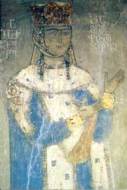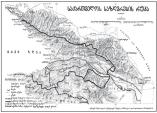• K. Abuladze – The Relationship of Georgia Jews
K. Abuladze
The Relationship of Georgia Jews to other National Minorities living in Georgia
The Jewish writer Abrek Batoshvili has said recently in print that “We, Georgian Jews, don’t possess any written or verbal document proving discrimination of our civil rights and that we were forced to reject our religion while living in Georgia.”
It must be mentioned that there is no other country except Georgia, where Jews carry out their religious service to church by candle or money. Documents from the XVII-XVIII centuries clearly show that Georgian Jews and Georgians had equal, economic and legal rights, they peacefully co-existed together.
The Jews are often blamed for not being patriotic and not protecting interests of the country where they live. Let’s listen to a Georgian scholar Z.Chichinadze who tells us the following: “As for our direct and active involvement in the international trade, Georgian Jews very often had a chance of high treason to sell some information to foes of the State. But they have never done this. There is neither written nor verbal record of this.”
Both Georgian and foreign sources of the feudal era do not present any facts regarding confrontations between Jews and other nationalities living in Georgia. This was guaranteed by the Georgian state policy as policy as well as Georgian people.
The Russian occupation of the Caucasus changed the situation dramatically . Their policy of “divide and conquer” damaged the long-established practice of friendly co-existence of national minorities in Georgia. This process was not successful in Georgia due to active resistance of the Georgian intellectuals.
Starting from XIX century Russian and European Jews moved to the Caucasus. Here they were met by local Jews with their versatile culture and language. These were Georgian highlander, Persian and Arabian Jews, as they had already lost their ancient Jewish language, morals, traditions. European Jews themselves were arrogant toward Georgian Jews, calling them various insulting, mocking nicknames. It seemed to be a clash of two worlds.
The Georgian Democratic Republic declared in 1921 created free developmental conditions for every nation living in this country, including Georgian Jews. It is very important to mention that the Act of Georgian Independence was signed by two Georgian Jews. Among others, Georgian Jews also experienced the Bolshevik “democracy” and “friendship of nations”.
In the early twentieth century in Georgia there was a wide spread collectivization of agricultural. According to the archived documents the Jewish people in Georgia had social-national problems with Ossetian and Cossack members of collective farms. The Jewish people had some problems in Tskhinvali, their gardens were taken away and they were oppressed by party and judicial organs.
The Jewish people called this relationship “National antagonism”. In 1936 Georgian Jews emphasized that “We live in great friendship with Georgians, Armenians, Turks, and Russians.” This assessment may be exaggerated in the Soviet Internationalist movies in Georgia, but it seems to be supported by facts.
Some Orthodox Communists blamed Soviet Georgians for Chauvinism and Anti-semitism. According to the reports of the Commission of National Minorities we see that this is based on Jewish people’s problems. The merchants children weren’t admitted to schools, technical schools, they had no right to vote, they weren’t given the land and seeds, etc.
The above mentioned facts demonstrate that the Soviet rules were to blame. Rabbi David Baazov put forward demands for the cultural autonomy of Georgian-Jews. The demand for cultural autonomy was considered to be Zionism and David Baazov was imprisoned.
Notwithstanding the assimilation to Socialist culture in 1921- 1940, the Jews had some achievements: Jewish theatre, museum, the house of culture, schools, libraries, etc. But we must mention, that the Georgian-Jews were in the worth situation among the national minorities in Georgia. They were deprived of learning in native language, of having access to printing presses. They had no right to vote, but this did not cause the battle between Georgians and Jews.
It is easy to find out the elements of Georgian Culture in the Jewish wedding, funerals, clothing, architecture. This is the result of long, good, neighbourly relationships between the Georgian and Jewish peoples.
In 1913 at the International Conference of Zionist in Frankfurt the speakers spoke about the facts of destruction of the Jews. One of the deputies denoted that there was no country where anti- Semitism has not existed. At that moment the representative of the Georgian Jews Mr. Baazov said: “My friends, there is such a country in the world. It is Georgia -a small Christian nation…Georgia does not have ghettos, ruin, discrimination. There was a loud applause after the speech.
The head of the conference General Jifman announced to the society “This country is very far away from us, but it must be very close to every Jew’s heart.. My sons, I want you to express your love toward the Georgian nation as well as you can.
Georgian-Jews religious tolerance was not destroyed during the Soviet period. In 1994 in Washington at the Word Jewish Congress Mr. Guram Batiashvili a Jewish writer said: “The experts announce to us the increase of anti-Semitism in different countries, but fortunately I can not give you such information. Georgia is such country where anti-Semitism can not take place. Anti-Semitism is recognized neither in the State nor in everyday life.
If Georgian Jews still receive respect and love this is not the result of the Soviet Power Politics toward the national minorities but the result of friendship and good will of the peoples themselves.
ქართველი ებრაელები და საქართველოს მოსახლეობა

















დატოვე კომენტარი